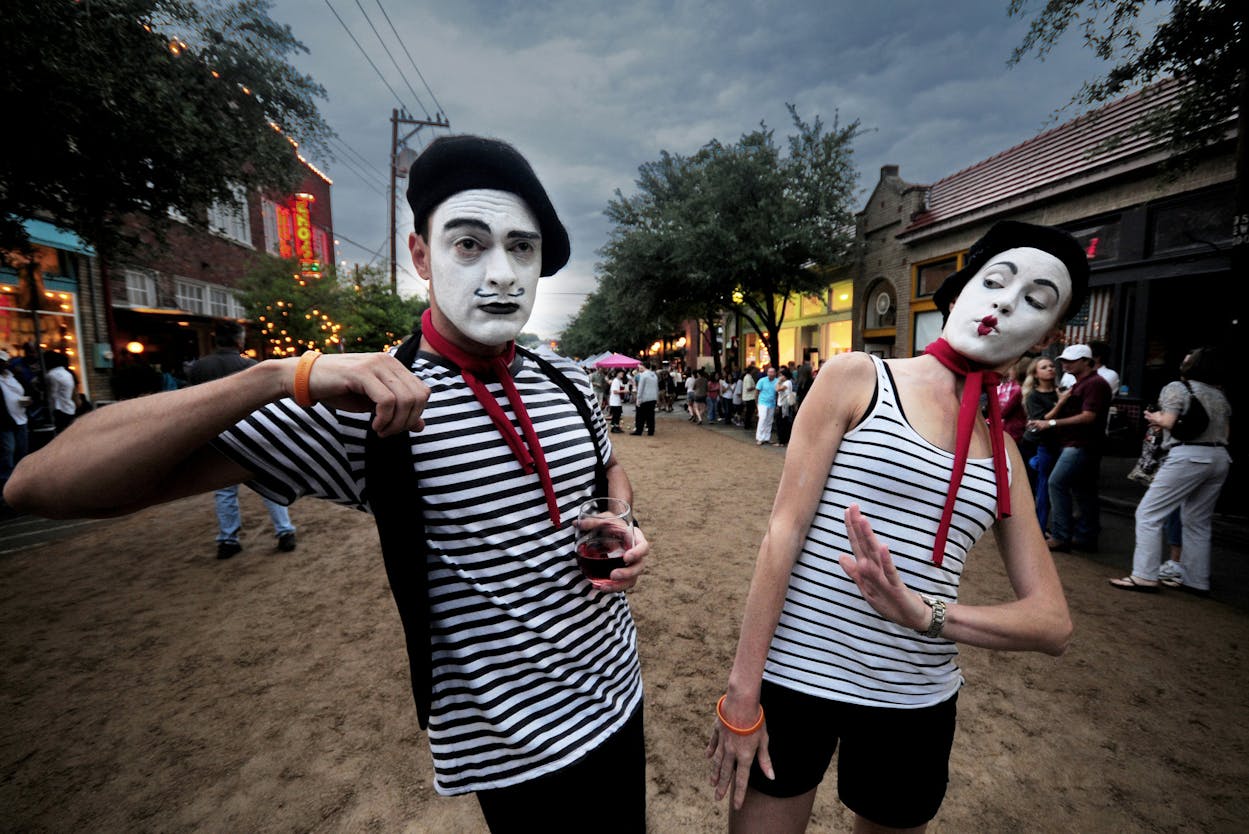On Monday, Oak Cliff residents will wake to find four tons of decomposed gravel covering part of Bishop Street.
The ground cover used in landscaping is being trucked in as a surface for playing pétanque — a French game similar to bocce, in which players try to throw hollow metal balls as close as possible to a small wooden ball. Pétanque matches are one attraction of the annual “Bastille on Bishop” street festival, a celebration of Bastille Day, the French national holiday.
Bastille on Bishop evolved from lawn parties hosted by Pierrette Lacour, a native of Dijon, France, who came to Dallas as an exchange student in 1977 and moved to the Oak Cliff neighborhood 10 years ago.
“When I moved to Oak Cliff, which I didn’t know anything about it, I fell in love with the neighborhood because it reminded me of the atmosphere of a little French village,” Lacour said. “I love being French, love to cook and have guests at my table, so immediately the first week after I moved I had a dinner party on my front lawn.”
The party became an annual tradition timed to Bastille Day. Five years ago she partnered with Jason Roberts of Go Oak Cliff, a nonprofit community group, and the official Bastille on Bishop party was born.
It may strike some as uncharacteristic that Dallas would embrace France’s national holiday, but the European country has deep ties to Texas. From 1685 to 1689, the French had a colony at Fort St. Louis on the Texas Gulf Coast, and from 1800 to 1803, France ruled Texas. France’s connection to Dallas, and the Oak Cliff neighborhood in particular, runs even deeper.
The area around Oak Cliff was once home to the 1200-acre utopian community for French-speaking colonists. In 1854, a Parisian philosopher named Victor Considerant published “Au Texas,” a book that advocated the establishment of a socialist community on the “Wild Eden” of the Texas frontier. The work was so persuasive that it lured nearly 200 French, Swiss and Belgians colonists to the area by 1855. The settlement, which they named Reunion, was an experiment in communal living that included efforts to plant a large common and vineyard, start a brewery, and construct a society with arts and culture as its basis.
“But it was, of course, unworkable,” said John Michael Cooper, a professor at Southwestern University in Georgetown, Tex., who is writing about the Reunion colony. “Many colonists were lawyers and professionals, artists and music teachers. What they needed were skilled farmers, ranchers and craftsmen. The end result was you had a lot of people who knew how to mix their paints, but couldn’t adapt the farming techniques of the mild climate of France to that of North Texas.”
At its height in 1857, Reunion had 350 residents and was larger than Dallas. But it took one hot summer of drought and a freak blizzard to make the foreigners lose faith in the experiment. The colony was disbanded within three years, and the land was eventually absorbed into Dallas.
Little evidence remains of the colony, save for a few gravestones and a series of street and place names, including that of Reunion Tower, Dallas’ landmark 561-foot building. Still, the colony has had a cultural influence on the city.
“The Reunion colonists were trying to plant European culture into the wild west of Texas,” Cooper said, “and the Dallas area was the first place where these things took firm root, decades before other rival cities in Texas.”
Today, that can be felt in Oak Cliff and in the Bishop Arts District, an area of restaurants, galleries, theaters, bookstores and coffee shops, which will host the Bastille on Bishop street party. About 4,000 people are expected to attend the French-inspired — if not actually French — activities, which include burlesque performances, a “wine walk” and a mussels “cook-off” among local chefs.
Jenni Stolarski, a Realtor and resident of Oak Cliff, has been attending Bastille on Bishop since the beginning. “There’s a real sense of play about it,” she said, “with the wine and dressing up in your stripy shirt and beret.”
Still, some events are perplexing, like the Vespa rally (where drivers will carry baguettes in their baskets), as Vespas tend to be more closely associated with Italy, where the company is based.
“Our collection of Citroën 2CVs is short in Dallas,” said Lacour, referring to the iconic French car from the mid-20th century, “so we use the next best thing. We do plan to have a great Citroën display next year. And besides we like Italians, as long as they don’t bring their bocce balls to our pétanque court.”






